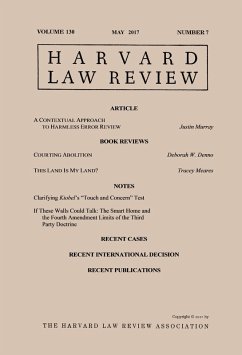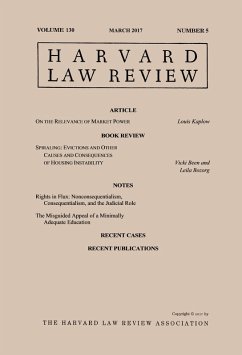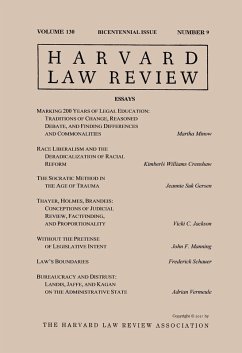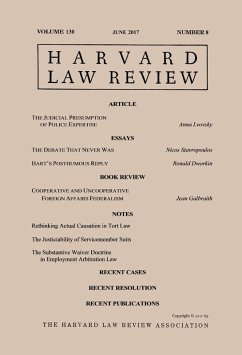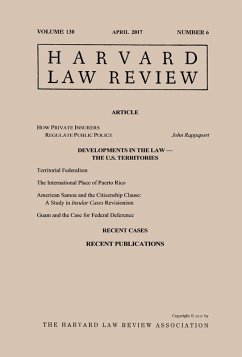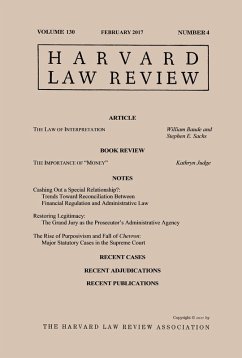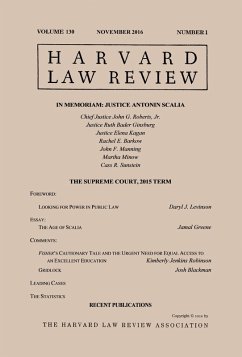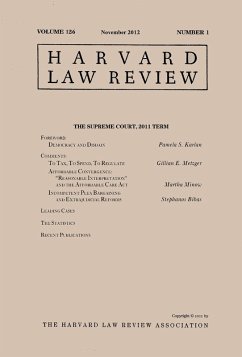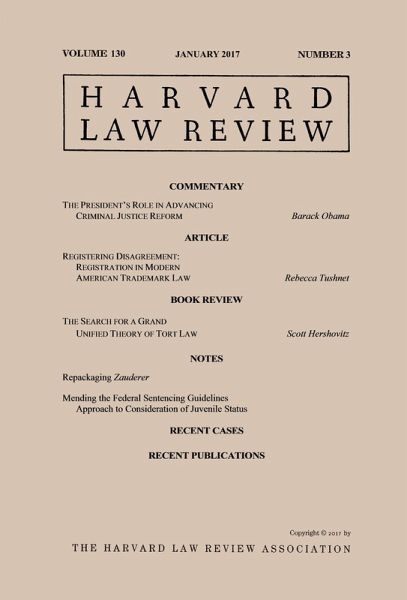
Harvard Law Review: Volume 130, Number 3 - January 2017 (eBook, ePUB)

PAYBACK Punkte
0 °P sammeln!
The January 2017 issue, Number 3, features these notable contents: * Commentary, President Barack Obama, "The President's Role in Advancing Criminal Justice Reform" * Article, Rebecca Tushnet, "Registering Disagreement: Registration in Modern American Trademark Law" * Book Review, Scott Hershovitz, "The Search for a Grand Unified Theory of Tort Law" * Note, "Repackaging Zauderer" * Note, "Mending the Federal Sentencing Guidelines Approach to Consideration of Juvenile Status" Furthermore, student commentary analyzes Recent Cases on: whether mug shots may be exempt from FOIA disclosure; a Ninth ...
The January 2017 issue, Number 3, features these notable contents: * Commentary, President Barack Obama, "The President's Role in Advancing Criminal Justice Reform" * Article, Rebecca Tushnet, "Registering Disagreement: Registration in Modern American Trademark Law" * Book Review, Scott Hershovitz, "The Search for a Grand Unified Theory of Tort Law" * Note, "Repackaging Zauderer" * Note, "Mending the Federal Sentencing Guidelines Approach to Consideration of Juvenile Status" Furthermore, student commentary analyzes Recent Cases on: whether mug shots may be exempt from FOIA disclosure; a Ninth Circuit ruling that concealed carry is not protected by the Second Amendment; collective action waivers in employment arbitration agreements under the NLRA; whether warrantless dog sniffs outside a suspect's apartment door violate the Fourth Amendment; deferred prosecution agreements and separation of powers; whether Due Process includes the right of access to counsel for detained noncitizens; and whether electronic bingo may be prosecuted by a state despite its exemption for local bingo games. Finally, the issue includes several brief comments on Recent Publications. The Harvard Law Review is offered in a quality digital edition, featuring active Contents, linked footnotes, active URLs, legible tables, and proper ebook and Bluebook formatting. The Review is a student-run organization whose primary purpose is to publish a journal of legal scholarship. It comes out monthly from November through June and has roughly 2500 pages per volume. Student editors make all editorial and organizational decisions. This is the third issue of academic year 2016-2017.
Dieser Download kann aus rechtlichen Gründen nur mit Rechnungsadresse in A, B, CY, CZ, D, DK, EW, E, FIN, F, GR, H, IRL, I, LT, L, LR, M, NL, PL, P, R, S, SLO, SK ausgeliefert werden.




